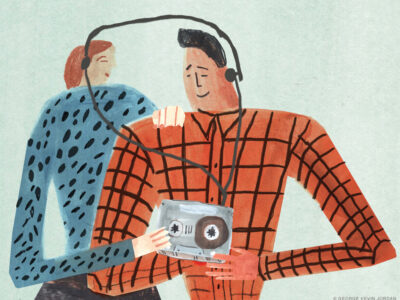
A first-generation college graduate looks back.
By Phyllis Lev Brust
Penn is a place for self-assured, accomplished students. I wasn’t one of them. I graduated in 1975, a first-generation college student from Philadelphia who commuted from home until the second semester of my junior year.
At first I was awestruck at Penn; I was a kid in a candy store. Producer Joseph Papp and director Harold Prince C’48 Hon’71 tried out plays at Penn before opening in New York. Tickets were free and students could watch from the wings. The actors brunched on omelets in my dorm. The NHL’s Philadelphia Flyers practiced at the Class of 1923 Ice Skating Rink and anyone could watch. I joined the University’s first women’s ice hockey club.
But my undergraduate peers intimidated me. I had never met so many students who could afford to fly away on vacation, whose parents had graduated from college, who majored in philosophy, or who owned a car. I once heard students discussing Anais Nin, and I had no clue who she was. I thought I’d missed a memo everyone else had received.
What I really lacked was confidence—a hazard for first-generation students. Without confidence, I was on a slippery slope: afraid to take risks, afraid of being embarrassed, and afraid of being punished. I was asked to write for the Daily Pennsylvanian. I declined because I didn’t think I was good enough. I felt lost, afraid that I was letting the University down.
First-generation students weren’t on anybody’s radar when I was in school. We were pretty much left on our own. That remained the case for decades after my own experience. A 2021 Pew Research Center survey found that only 26 percent of 22- to 59-year-olds without a college-educated parent had completed a bachelor’s degree, compared with 70 percent of adults with at least one college-degreed parent. In 2019, University of California public-policy professor David Kirp argued in the Chronicle of Higher Education that colleges haven’t given students “the we-have-your-back-support they need.” He called for financial aid reform, mentoring, and other initiatives to help level the playing field for first-generation college students and others in need.
Now first-gens are considered a vulnerable group. Universities across the country have suddenly rushed to support them. In 2015 Penn students Sam Trinh C’16 and Yessenia Gutierrez C’15 started the student group Penn First expressly to advocate for and represent first-generation and low-income (FGLI) students [“Gazetteer,” Jan|Feb 2016]. Penn First’s web page reads, “There are many students just like you.” That’s a powerful message. Being a first-generation student can be isolating.
The next year Penn’s University Life department established a FGLI program at the Albert M. Greenfield Intercultural Center, and a couple years after that the University launched the Penn First Plus initiative to ensure that “all Penn students have access to the tools and supports they need to thrive during their study at Penn.” First-generation, and low- and middle-income students fall within its purview. The Penn First Plus web page describes the program as a “hub for efforts to make the campus more inclusive of all forms of diversity, specifically at the intersections of social and economic background.”
Its initiatives include the Penn First Plus Ambassadors—faculty and staff especially trained about issues critical to the success of first-gen and lower-income students. I could have used an Ambassador back in the 1970s, when I reached out to a faculty instructor after realizing that I’d picked the wrong major and didn’t know what to do. “Why are you talking to me?” she said, walking away. I never asked anyone else. I’d like that moment back.
I got the head slap I very much needed during my senior year. A visiting theater director from New York assigned students to direct a scene from Karel Čapek’s dystopian play R.U.R. (which introduced the word robot to the English language) for a noncredit workshop I was taking. I was too scared to do it, so I watched. I knew I’d missed a once-in-a-lifetime opportunity after another student directed actors to dance in a serious scene—in this play about the annihilation of the human race. The director gently encouraged him to redo the scene. I vowed not to miss another opportunity.
My struggles at Penn eventually morphed into curiosity about how confidence and exposure affect people’s career choices. That led to a 30-year vocation as a college career counselor and consultant, driven by a quest to help college students on their journeys. Now I’m the one who watches anxious students’ necks get splotchy and ears turn red when they tell me their dreams and fears. People share their innermost feelings—whether they feel lost, want to be president, fantasize about playing Winnie the Pooh at Disneyland, or regret the path not taken. I have never said, “Why are you talking to me?” I tell them what makes them special when they can’t see it. I have sought to expose students to as many different hands-on experiences as possible.
So here’s my advice for today’s underconfident students—first-generation or not—whether they’re starting out or looking back, or whether they are a parent, teacher, or friend trying to help:
• You are likely to take your gifts and interests for granted. You think that if something comes easy for you, it comes easy for everyone. It doesn’t.
• No journey is a straight path. Embrace your mistakes. The knowledge gained from those mistakes will differentiate you and help further your career, though you probably won’t realize it at the time.
• If a sibling or friend is considered the smart one, that doesn’t mean that you are the stupid one.
• Grades are not necessarily indicative of ability. They could reflect anxiety, a lack of interest, or perhaps even an undiagnosed learning disability. And grades rarely measure such critical skills as empathy and dedication.
• Don’t bury your desires just to please others, including parents.
• It’s OK not to know what you want to do. Learn what you are good at, what you enjoy, and what makes you unique.
• Avoid being a square peg squishing yourself into a round hole. Don’t limit your universe to published lists extolling the best-paying jobs. The world is more complex than “STEM equals success and humanities majors fail.”
• People often think they are too old to change. They aren’t. My 69-year-old husband received a PhD in history last year.
• Find supporters. They are there.
• Forgive yourself. It’s not easy.
• Finally, take risks. At times you will fail. But that beats looking back regretfully—even if you’re recollecting dancing robots in a dystopian play.
Phyllis Lev Brust C’75 G’83 Gr’90 is the founder of CareerMutt. She lives in Gainesville, Florida.





Phyllis Lev Brust’s article resonated with me because I was also a first-generation college student and a commuter at Penn in the 1970’s. My parents were Sicilian immigrants, blue collar workers with a fifth-grade education. Hardly anyone at Penn shared my experiences. Like Brust, I was a trailblazer who was not “on anybody’s radar” and was pretty much left on my own.
Elite institutions like Penn lack socio-economic diversity, but I am hopeful that Penn’s recent efforts to assist first-generation students will result in more such students being admitted and that more trailblazers will grow and thrive. Thank you for publishing Brust’s article!
Thank you for sharing your experience and for your kind words.